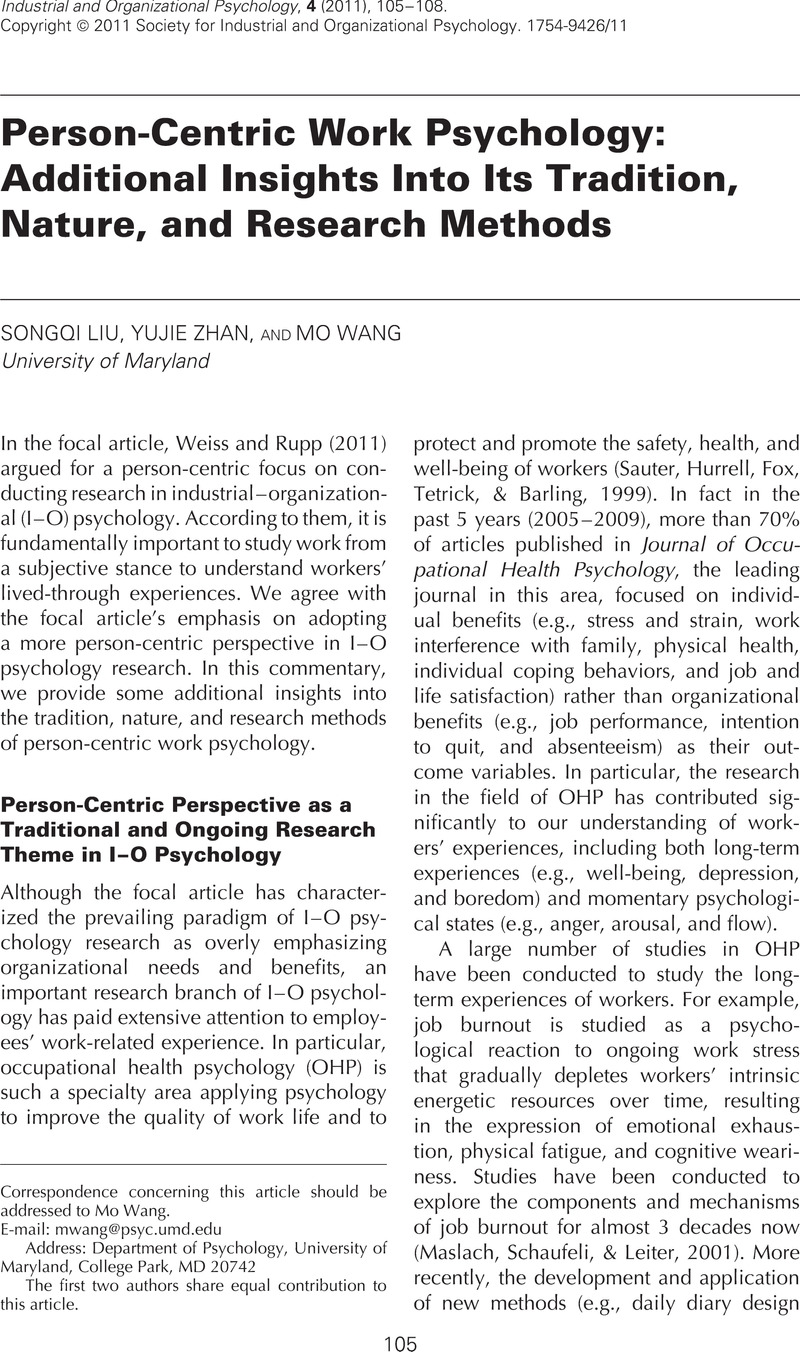Crossref Citations
This article has been cited by the following publications. This list is generated based on data provided by Crossref.
Weiss, Howard M.
and
Rupp, Deborah E.
2011.
Envisioning a Person-Centric Work Psychology.
Industrial and Organizational Psychology,
Vol. 4,
Issue. 1,
p.
138.
Liu, Songqi
and
Wang, Mo
2012.
The Role of the Economic Crisis on Occupational Stress and Well Being.
Vol. 10,
Issue. ,
p.
1.
Hanges, Paul J.
and
Wang, Mo
2012.
The Oxford Handbook of Organizational Psychology, Volume 1.
p.
79.
Liu, Songqi
Wang, Mo
Bamberger, Peter
Shi, Junqi
and
Bacharach, Samuel B.
2015.
The Dark Side of Socialization: A Longitudinal Investigation of Newcomer Alcohol Use.
Academy of Management Journal,
Vol. 58,
Issue. 2,
p.
334.
Zheng, Xiaoming
Zhu, Weichun
Zhao, Haixia
and
Zhang, Chi
2015.
Employee well‐being in organizations: Theoretical model, scale development, and cross‐cultural validation.
Journal of Organizational Behavior,
Vol. 36,
Issue. 5,
p.
621.
Woo, Sang Eun
Jebb, Andrew T.
Tay, Louis
and
Parrigon, Scott
2018.
Putting the “Person” in the Center.
Organizational Research Methods,
Vol. 21,
Issue. 4,
p.
814.
Chevalier, Séverine
Fouquereau, Evelyne
Gillet, Nicolas
and
Bosselut, Grégoire
2018.
Unraveling the Perceived Reasons Underlying Entrepreneurs' Retirement Decisions: A Person-Centered Perspective.
Journal of Small Business Management,
Vol. 56,
Issue. 3,
p.
513.
Berdutin, Vitaliy
2020.
Robust management tools for a person-centered medical organization.
Glavvrač (Chief Medical Officer),
p.
17.
Nijs, Sanne
Dries, Nicky
Van Vlasselaer, Véronique
and
Sels, Luc
2022.
Reframing talent identification as a status‐organising process: Examining talent hierarchies through data mining.
Human Resource Management Journal,
Vol. 32,
Issue. 1,
p.
169.
Bush, John T.
Baer, Michael D.
Welsh, David T.
Outlaw, Ryan
Garud, Niharika
and
Sessions, Hudson
2022.
To What Do I Owe This Visit? The Drawbacks and Benefits of In-Role and Non-Role Intrusions.
Journal of Management,
Vol. 48,
Issue. 7,
p.
1888.
Zhang, Zhipeng
Liu, Guangjian
Pei, Jialiang
Zhang, Shuxia
and
Liu, Jun
2024.
Perceived algorithmic evaluation and app‐workers' service performance: The roles of flow experience and challenges of gig work.
Journal of Organizational Behavior,



